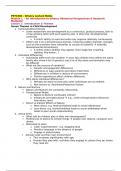Class notes
PSYC302 (Infancy) Module 1 & 2 Notes
- Course
- PSYC 302 (PSYC302)
- Institution
- University Of British Columbia (UBC )
This document contains comprehensive lecture notes from PSYC302 (Infancy) Modules 1 and 2, providing an in-depth overview of foundational topics in the study of infancy. Module 1 introduces historical perspectives on infant development and discusses key infant development theories. It details vario...
[Show more]



